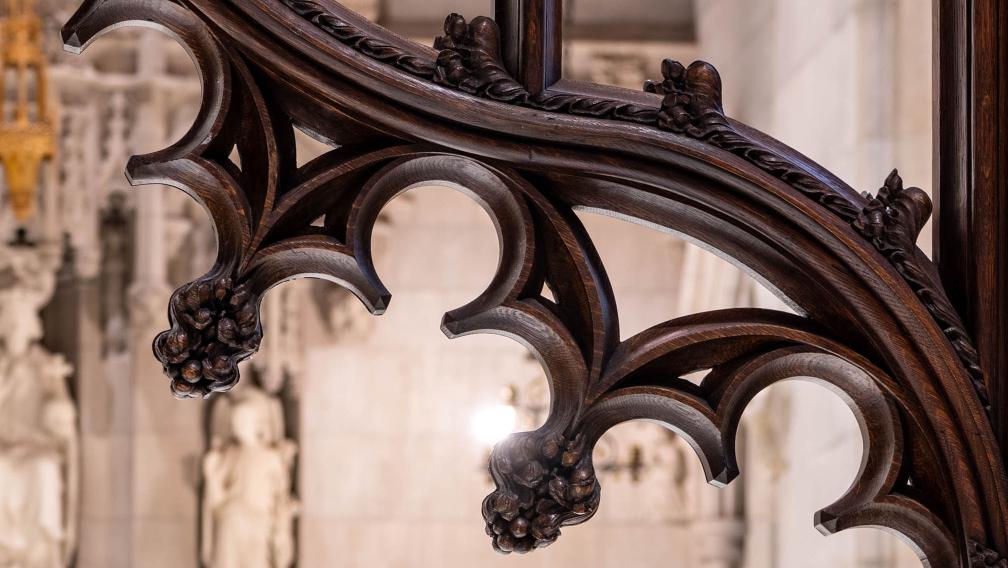Acts 16:16–18
One day, as we were going to the place of prayer, we met a slave-girl who had a spirit of divination and brought her owners a great deal of money by fortune-telling. While she followed Paul and us, she would cry out, ‘These men are slaves of the Most High God, who proclaim to you a way of salvation.’ She kept doing this for many days. But Paul, very much annoyed, turned and said to the spirit, ‘I order you in the name of Jesus Christ to come out of her.’ And it came out that very hour.
The first-person account of the acts of the apostles — the Book of Acts — tends to read like a novel. But we cheat ourselves if we take it only as a linear narrative. This Sunday’s story is often easily digested as a tale of God’s triumphal righteousness prevailing over injustice. And Paul is seen as the avenged and benevolent superhero.
But what if the metaphorical point of the enslaved girl, the exorcism, the beating, the prison, and, of course, the dramatic earthquake and aborted jailbreak was about the prisons of our best and worst human impulses? Those knee-jerk reactions that cause division and marginalization of others.
It’s pretty clear that Paul’s impetus to remove the “spirit” from the already exploited girl was not to liberate her but because he was annoyed with her slander — her voice. What happened to her afterward, anyway? Paul’s indignation over his perceived persecution got flipped around and the slaveowners became the victim. Was this classic biblical gaslighting or the deeper message in the writing?
Perhaps this story is not simply about God rewarding believers but another of Paul’s (and humanity’s) “conversions” — from hubris to humility, again and again, continuously. Could the cyclical nature of our reunions with the Holy Spirit be the divine oneness we all share? Is this what Jesus pleads for us in the Gospel just before he ascends to be one with God; incarnation to reincarnation, the Alpha and the Omega?
—Kathryn Carroll
THEOLOGY
Wil Gafney preaches a sermon exploring Paul’s, and even Jesus’s, enslavement to the acceptance of enslavement, which is vividly illustrated again in this week’s scriptures.
SOCIAL JUSTICE
Jonny Clark writes about this week’s Gospel and the pitfalls of limiting inclusion and justice with dualistic purity standards.
VISUAL ART AND MUSIC
Almost completely hidden on the Statue of Liberty are Lady Liberty’s feet with broken shackles. Consider this image and story with the scriptures this weekend when we honor those who gave their lives for the freedom of others.
Memorial Day began when the Civil War ended, to honor fallen soldiers. There are many claims to holding the first observances. “However, one of the earliest and perhaps largest ceremonies was held in Charleston, South Carolina, in 1865,” according to the National Parks Service. “[I]n May 1865, newly freed African Americans reburied 257 Union soldiers, who had died in a prison camp and were hastily buried, in order to give them the proper honors in death. The new graves were blanketed by flowers and dedicated, with thousands of people parading down the racetrack that had been the site of the prison camp.”
Sing along with this song of freedom, hope, and remembrance: “Lift Every Voice and Sing,” also known as the Black national anthem.
POETRY
Read “Crazy Quilt” by Jane Wilson Joyce. While seamless oneness may not be possible for God’s human kin-dom, we may still be able to create something of beauty that can enfold us all.
Get the Five Ways In Your Inbox
Sign up to receive reflections and updates from the Faith Formation & Education team.
Coming Up
Join Summerlee Staten and Dr. Susan Ward this Sunday at 10am for the final session in this series of Discovery. They’ll moderate a discussion about renowned stained-glass artist Thomas Denny, the designer of Trinity’s new stained-glass window, as we learn about his artistic process and the meaning of this new work for Trinity’s community and beyond. And stay tuned for details about the upcoming fall Discovery series.
Coming to Trinity this fall, Sacred Ground is a film- and readings-based dialogue series on race, grounded in faith. Through this curriculum, small groups walk through chapters of America’s history of race and racism together while weaving in threads of the family story, economic class, and political and regional identity. The curriculum focuses on Indigenous, Black, Latino, and Asian/Pacific American histories as they intersect with European American histories. Contact Ruth Frey to learn more about this transformative program and to register.
